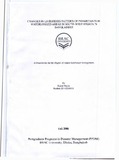| dc.contributor.advisor | Khan, S. I. | |
| dc.contributor.author | Rejve, Kaiser | |
| dc.date.accessioned | 2011-10-04T04:05:22Z | |
| dc.date.available | 2011-10-04T04:05:22Z | |
| dc.date.copyright | 2006 | |
| dc.date.copyright | 2006 | |
| dc.date.issued | 2006-09 | |
| dc.identifier.other | ID 05268018 | |
| dc.identifier.uri | http://hdl.handle.net/10361/1383 | |
| dc.description | This dissertation is submitted in partial fulfillment of the requirements for the degree of Master in Disaster Management, 2006. | |
| dc.description | Cataloged from PDF version of Dissertation. | |
| dc.description | Includes bibliographical references (page 89 - 91). | |
| dc.description.abstract | The coastal zone specially in South-West part is ever dynamic and changes occur
continually due to natural reasons, anthropogenic reasons and at the same time due to
management interventions. What ever is the agent of changes have direct influence on the
status and quality of coastal dweller’s life and livelihood. It is absolutely necessary to
understand the development processes and dynamics in this region. Measurement of the
conditions of the natural systems functionality, resource bases health, resources flow in one
hand and at the same time access of the dwellers in this region to the services and resources
are necessary to understand the well being of the dwellers in South-west region.
This document is based on an analysis of existing data, information and experiences
accompanied with findings of questionnaire survey conducted for this study.
Study revealed that the region has been subjected to different kinds of environmental
imbalance and natural disasters ever since the implementation of "development" projects
that are clearly at odds with the region's environmental characteristics, and are ecologically
unsound.
No holistic attempt at investigation and research has been made to ascertain the negative
impacts of river siltation, waterlogging, salinity and other disasters on the life of the people
- especially women and children - and on their economic and family lives, on education,
health, and hygiene.
Therefore we need to take a correct approach towards the development of the South-west
region. Isolated mechanical and technological approaches that have no consideration for the
environment will necessarily fail to address the uniqueness and the problems of the coastal
region. Only an eco-technological approach may bring about real development of the
region.
Study shows that local people have been trying to take part in decision making processes.
Foreign experts come and go but they have no stake in the environment in which they apply
their ‘superior’ knowledge and skills. But the local people have. They have to stay there
and survive. Any change in the environment profoundly affects local communities and the
lives of the people. Therefore, if local communities have to achieve desired progress, they
have to have more power in taking decisions. Abstract facts, data, and debates on different
issues should be made simple, so that people can easily understand these issues, and realize
their own roles in the development of their region, as well as the consequences that might
follow, and what they should do in such eventualities. | |
| dc.description.statementofresponsibility | Kaiser Rejve | |
| dc.format.extent | 126 pages | |
| dc.language.iso | en | en_US |
| dc.publisher | Department of Architecture | en_US |
| dc.rights | BRAC University dissertation are protected by copyright. They may be viewed from this source for any purpose, but reproduction or distribution in any format is prohibited without written permission. | |
| dc.subject | Disaster management | |
| dc.title | Changes in livelihood pattern of inhabitants in waterlogged areas in south-west region in Bangladesh | en_US |
| dc.type | Dissertation | en_US |
| dc.contributor.department | Department of Architecture, BRAC University | |
| dc.description.degree | M. Disaster Management | |

